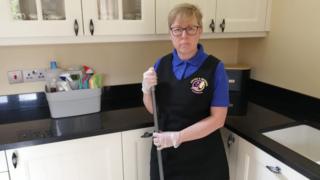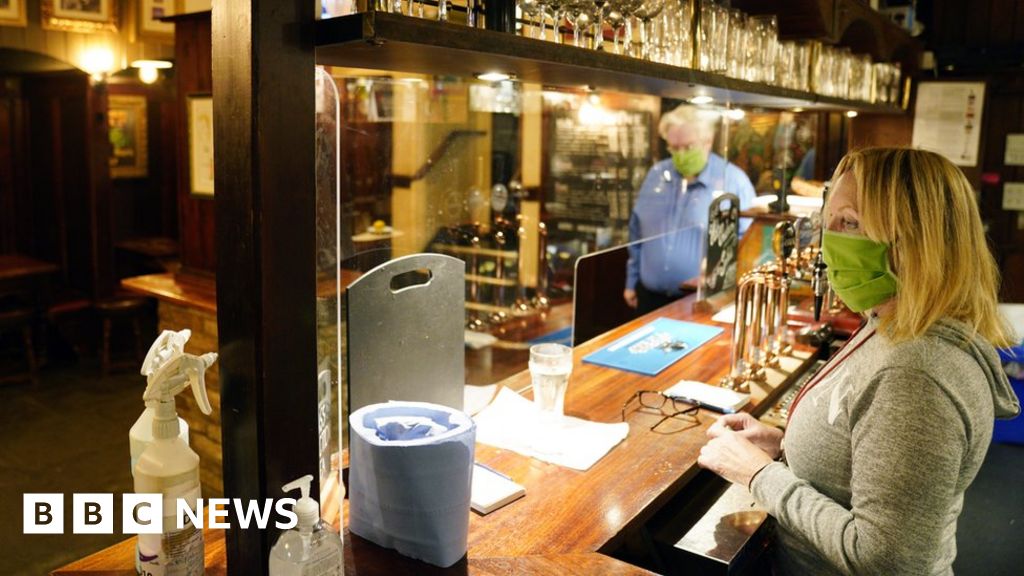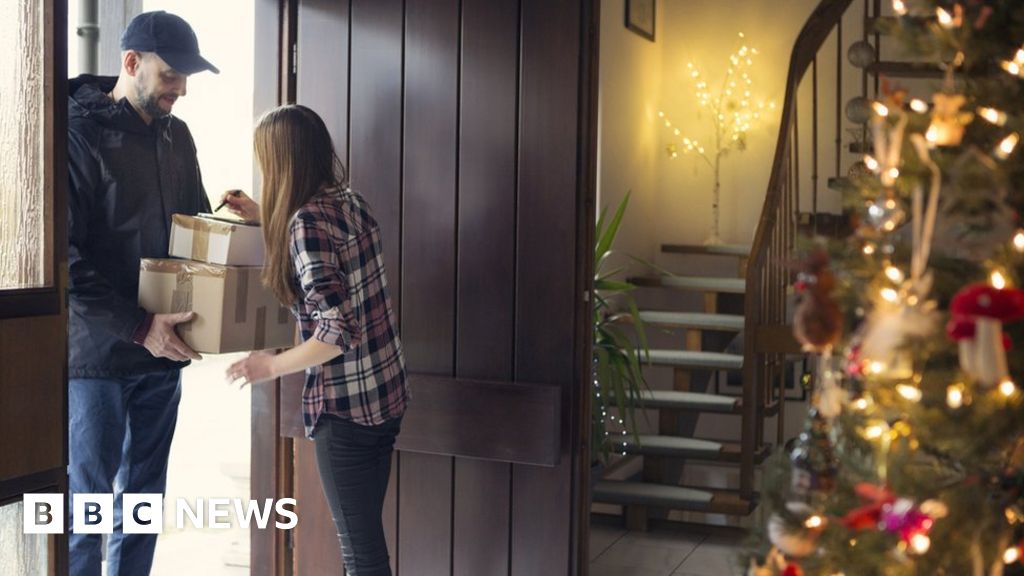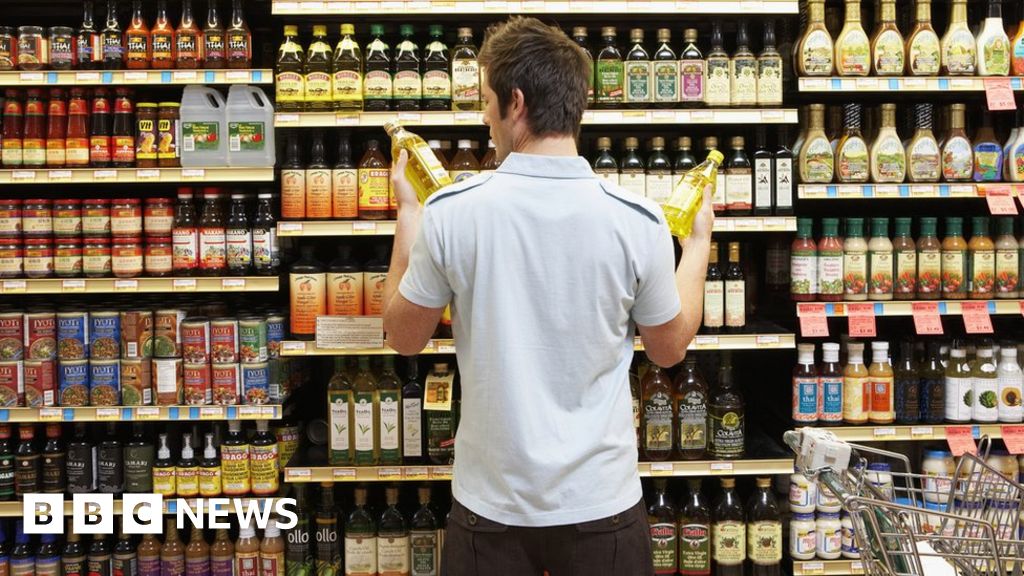 Image copyright
Louise Parkinson
Image caption
Louise Parkinson has been living off her savings for months
Image copyright
Louise Parkinson
Image caption
Louise Parkinson has been living off her savings for months
Liam and Louise Parkinson's cleaning business was just a few weeks old when the coronavirus outbreak forced them to stop working.
The husband-and-wife team based in Chippenham, Wiltshire, launched their company Abode and Beyond in January and soon began hiring extra staff to meet the demand from new clients.
But then - as news of the coronavirus spread - business quickly dropped away.
"Within 18 hours we'd gone from 30 customers down to one or two," Liam says.
When the country went into lockdown on 23 March, Liam and Louise had to tell their clients they were suspending all services.
In early June, the couple began working again, but only a quarter of their previous clients have booked home cleaning.
Image copyright Getty Images"Lots of people say now they can't afford to have a cleaner because they're struggling financially," Liam says.
Other customers have told them cleaning would be too much of a disruption while they're working and educating children from home. And some clients are shielding or worried about the risk of catching Covid-19 from workers coming into their home.
Those concerns mean cleaners all over the country are facing huge financial challenges, especially as those who work cash-in-hand aren't eligible for government support.
'I need the extra money'
Martyna, not her real name, works part-time as a domestic cleaner to supplement her main job as a housekeeper at a London hotel.
She's been furloughed - or put on state-paid leave - by the hotel but is struggling to get by without the added income cleaning would normally provide.
"For more than two months, I didn't do any cleaning work," she says. Now she's waiting for her clients to call. "It's boring and also I need the extra money. The [furlough] money is only for the rent and food. It's nothing."
Cleaning staff are permitted to work in people's homes, but industry leaders say there hasn't been clear guidance from the government advising cleaners how to keep themselves and their clients safe.
Image copyright Stephen Munton Image caption Domestic Cleaning Alliance director Stephen Munton"There's nothing that we can adhere to, we've just got to decide for ourselves what's appropriate, it's a huge worry," says Stephen Munton, director of the trade body the Domestic Cleaning Alliance.
"We're reliant now on people telling us what they want us to do in their home, what they want us to wear. Should we be taking equipment in, because we don't know whether we should be using what's in the house?"
The British Cleaning Council (BCC), which represents 20 trade groups across the cleaning industry, has written to the Small Business Minister Paul Scully, asking for a meeting to clarify some of those issues, but no such meeting has been arranged.
The BCC says that's left cleaning businesses to come up with safety protocols for themselves.
A spokeswoman for the Department for Business, Energy and Industrial Strategy pointed to the government's general coronavirus guidelines for all people who work in private homes.
"We have worked closely with businesses, unions and medical experts to develop practical guidelines specifically for those working in other people's homes. These are aimed at making workplaces as safe as possible and giving staff confidence to return to work," she said.
"We regularly review the science behind the guidance and will continue to work closely with a wide range of stakeholders, including the British Cleaning Council, as we continue to reopen the economy."
Image copyright Chris Wootton Image caption Chris Wootton's staff wear masks when cleaning but "smile with their eyes"Chris Wootton runs the domestic cleaning business Poppies, which has 22 franchises across England and usually provides 6,000 cleaning services a month.
All 450 Poppies staff have been furloughed during the lockdown, but now each of the franchises is back up and running.
"In simple terms, we've assumed that any of our clients or our staff may be pre-Covid or asymptomatic," he says. "So we've protected one another by practising social distancing, providing gloves, shoe covers, masks and aprons for all our staff."
Chris has also introduced new protocols for when cleaning staff arrive at their clients' homes.
Staff cannot hug or shake hands with their clients. They have also been instructed to wear a mask on arrival, then take two steps back after knocking on the door. "We do our best to smile with our eyes. That very moment gives our clients confidence," he says.
Chris, who also manages his own Poppies franchise, says older clients make up about a third of the domestic cleaning market.
Barbara and Jim Jackson are in their 80s and are self-isolating because of the virus. They're among those who have put their regular cleaning service on hold.
"When we feel it's safe to have people come into the house, we will go back to a cleaner because they've been wonderful for us over the years," says Barbara. "At the moment we have to share the chores between us."
Once the coronavirus is no longer a risk, Chris Wootton is optimistic he'll see an upturn in elderly customers.
"I think they will be a growth area for us because those people will want to stay longer in their own home and not go into a care home," he says.
'Zero income'
Meanwhile, back in Chippenham, Liam and Louise Parkinson are hoping more clients will soon start booking their cleaning service again.
The couple have been living off their savings since March, since they chose not to apply for government support.
"We were a new company and we were really unsure whether we would qualify. We didn't think 10 weeks later we would still not be working," says Liam.
"We have had literally zero income from that day so it has been really tough. We're between £5,000-£7,000 out of pocket in lost company earnings. It's pretty worrying. It's wiped out all of our personal savings."

 5 years ago
779
5 years ago
779 

